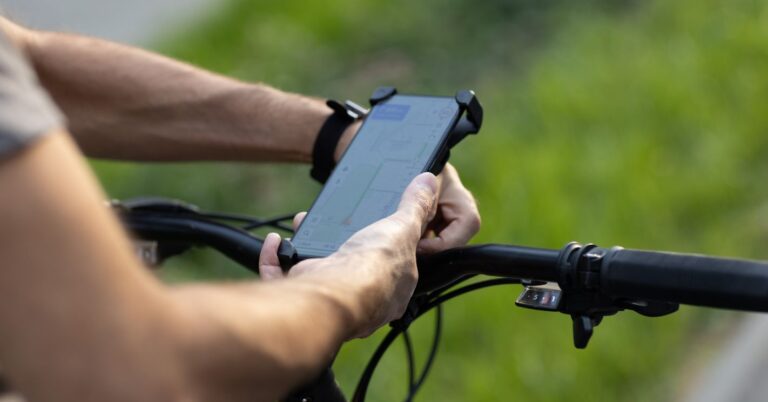Introduction to Finding E-Bike Routes
Owning an e-bike opens up a world of possibilities for exploration and adventure, and discovering new routes can make your rides even more enjoyable. In this guide, we’ll show you how to find the best local electric bike routes by leveraging online tools and local biking communities. Soon, you’ll be ready to explore new routes like a pro!
The Importance of Exploring Local E-Bike Routes
Finding and exploring new routes in your area will help keep your rides fresh and exciting. Letting you break away from the worn-out routine paths, discover hidden gems, and uniquely connect with your city.
Understanding Your Town or City’s E-Bike Infrastructure
Before diving into the nitty-gritty of route planning, familiarize yourself with the local e-bike infrastructure. Many urban areas now offer dedicated bike lanes and shared-use paths.
Almost every state in the US allows e-bikes to travel on any traditional bike route or trail, but never assume, check the local regulations before hitting the road.
While you’re out and about, look for signs and markings. Many e-bike-friendly trails are marked with signs or symbols that can help you identify the best routes for your e-bike.
Leveraging Online Resources for Route Planning
The internet is a treasure trove of information, and it’s no different when finding e-bike paths.
Using Google Maps for E-Bike Routes
Ah, Google Maps, we’d all feel completely lost without it. But this versatile tool isn’t just for driving directions. It also offers a built-in feature that can filter and display bike trails. Accessing it is simple and provides endless possibilities for bike routes at your fingertips.
Dedicated Apps and Websites for E-Bike Route Planning
- Bikemap is a well-loved route planning and navigation app that offers extensive free features like route planning, real-time updates, and an archive of over seven million user-generated routes. One of the coolest things it provides is an option for cyclists to alert others about encountered problems during rides!
- Komoot offers offline navigation; you can design routes and access navigation without an internet connection. It’s an excellent choice for off-road e-bike explorations. User-uploaded points of interest provide insights into routes and are great for conventional road routes. It supports turn-by-turn directions and offers a premium upgrade for features like live tracking and weather forecasts.
- Strava is a renowned exercise tracking service that prioritizes activity recording and sharing. It’s uber-popular among cyclists and runners, using GPS to map routes and record data like speed and duration. While advanced route planning requires a subscription, free features include challenges and leaderboards. Not to mention that connecting with compatible GPS devices is super simple.
- The League of American Bicyclists offers a searchable database of bike trails across the United States, perfect for discovering nearby e-bike routes. You can also use the site to help find e-biking communities and events in your area.
Online Biking Communities and Forums
Joining online biking communities or e-bike enthusiast forums can be a goldmine of information. Members often share their favorite routes, tips, and experiences, helping you discover new paths (and maybe some that aren’t as well-known).
Engaging with Local Biking Communities
Connecting with fellow local e-bike owners is a great way to learn from experienced riders and make new friends who share your passion for cycling.
Read on to learn how you can engage with these communities.
Local bike clubs and meetups
Many towns have bike clubs that organize group rides and events. Joining these clubs can introduce you to various e-bike routes and provide opportunities to befriend like-minded people.
Biking events and group rides
Keep your eyes peeled for biking events in your area. These events will often showcase scenic routes and allow you to meet other local e-bike enthusiasts.
Learning from Other E-Bikers’ Experiences
Tap into the wisdom of experienced e-bikers to get those insider tips for city e-biking. Whether you meet them in person or connect through online forums, their firsthand experiences can lead you to fantastic routes you might not have discovered otherwise.
Another excellent resource for finding electric bike-friendly city routes is checking with a local bike shop. Many have maps or lists to help you with your urban e-bike adventures and have direct knowledge of what local bike clubs and online forums are best in that area. While you’re there, chat with their employees, many of them tend to be enthusiasts and are intimately involved in the local cycling community.
Tips for Exploring with an E-Bike
Alright, so you’ve found some exciting e-bike routes, and it’s time to hit the road, but first, you’ve got to consider your safety and deeply understand local traffic rules and biking etiquette.
Safety Precautions for E-Bike Riding
Follow these precautions to ensure the most enjoyable ride possible:
- Wear a helmet: Helmets are your best defense against head injuries. Always wear a properly fitted helmet, regardless of the distance you plan to ride.
- Use proper signaling: Signaling your intentions is important for other road users to understand your movements.
- Observe traffic rules: Treat your e-bike like any other vehicle on the road. Obey traffic signals, stop signs, and lane markings to prevent accidents and help ensure a smooth traffic flow.
- Be visible: If you plan to ride at night, ensure your e-bike has front and rear lights working. Wear bright colors to boost your visibility to other motorists. Note: What may seem bright during the day isn’t always the same at night. Colors like neon yellow, green, and orange are the best for night riding. Vests and ankle wraps with silver reflective strips on them are also important. Make sure to wear them on the left side so that it’s more easily seen by passing traffic.
- Stay aware of your surroundings: Pay close attention to your surroundings and watch for any potential hazards. This includes never riding with headphones on, looking 20-30 feet ahead of you instead of at your front tire, and finding alternate routes around construction zones or busy intersections.
Understanding Traffic Rules and Biking Etiquette
Here are some tips for responsible and respectful city exploration on an e-bike:
- Know the local regulations: Familiarize yourself with the specific e-bike laws and regulations in your area. For example, some trails may require you to have a permit or to stay on the designated trails. Additionally, some e-bikes may be considered an e-vehicle, which would require registration with the DMV.
- Stay in the bike lane: Ride in designated bike lanes or paths whenever possible. If there are no dedicated lanes, stick to the right side of the road, allowing faster vehicles to pass on the left.
- Yield to pedestrians: Pedestrians always have the right of way. Slow down or stop when approaching pedestrians on shared-use paths, and give them enough space to feel comfortable.
Be courteous to other cyclists: When riding in a group, maintain a single-file formation to allow other cyclists and vehicles to pass safely. Use hand signals to communicate with fellow riders. - Respect traffic signals: Stop at red lights, stop, and yield signs as you would when driving a car.
Making the Most of Your E-Bike Features on Different Routes
Most e-bike models include features to help enhance your ride on different routes. Battery management allows you to conserve power during longer rides using pedal assist and can be turned up to provide an extra boost on hilly terrains.
You can also track your ride using e-bike apps that monitor distance, speed, and elevation gains to help you set new biking goals and improve your performance.
Remember that e-bikes are great for various terrains, but they’re not always ideal for off-road riding. Make sure to choose the appropriate route for your specific e-bike type, class, and model.
Final Thoughts
By now, you should be ready to explore urban e-bike routes like a pro. You can confidently navigate your town’s best-kept secrets by using online resources, engaging with local biking communities, and practicing safety.
Remember, every ride is an opportunity to discover new areas and make memories. So, gear up, hop on, and let the good times roll.



